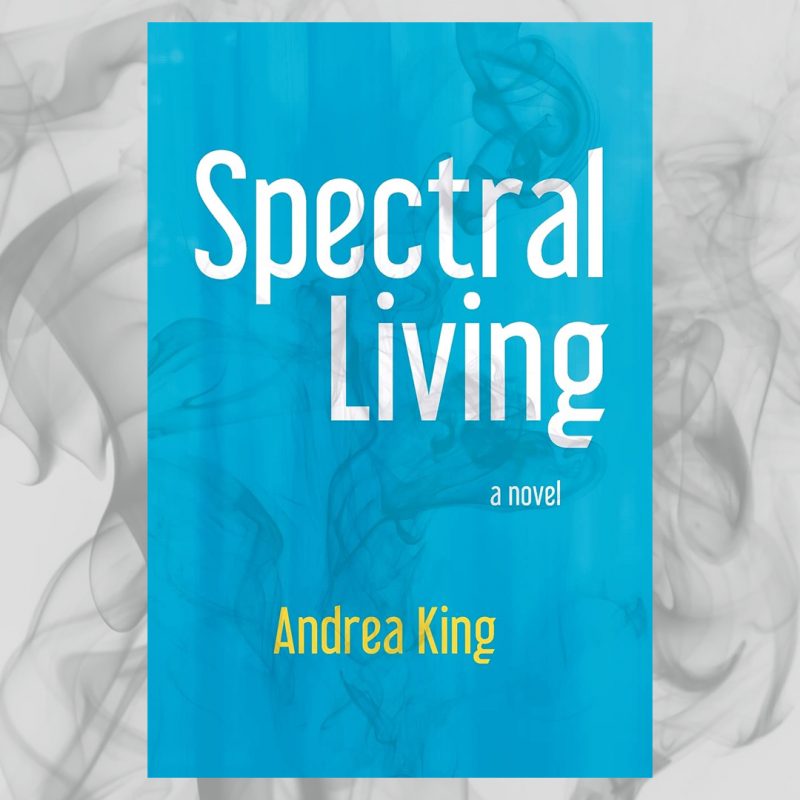USEREVIEW 079: Do You Believe in Ghosts?
Like a seance, this traditional review by Deirdre Danklin will reveal the spirits that animate Andrea King’s debut novel Spectral Living (University of Calgary Press, 2021).
ISBN 978-1-77385-147-1 | 192 pp | $27.99 CAD — BUY Here
#CAROUSELreviews
#USEREVIEWEDNESDAY
Do you believe in ghosts? This question comes up at every gathering of writers I’ve ever hosted. Above a cheeseboard, putting jam on scones, the question pops out. Most of my friends believe — they swear upon memories of gossamer figures floating down childhood staircases, of invisible weights pressing into their duvets. I’m the skeptic — wouldn’t we be covered in ghosts? I ask, picturing a never-ending sea of ectoplasm, the last wispy remains of every dead person who ever lived. Don’t you just want ghosts to exist because it would be a great story?
Spectral Living by Andrea King takes this central question of haunting and literature and unspools it over the course of the novel. Marian, our main character, is stuck in a PhD program about Quebecois literature, pulled towards the subject of ghosts and ghost stories even if she senses that the rest of academia could not care less. Through Marian, we learn fascinating stories of hauntings and grisly deaths, such as the dark tale of La Corriveau — a Quebecois woman who was put to death for killing her second husband and whose corpse traveled the world hung with chains inside a metal cage. King is careful to present her story as it appears in the historical record and how it was changed over time by Canada’s changing views of women and the struggle between French and British Canada.
But Marie-Josephte is a woman who has killed her husband. She is not only murderous, but insubordinate. A traitor. The sanctity of the patriarchy has been violated. She must be made an example of. For this reason … Marie-Josephte is taken down and encased in a tight-fitting, iron exoskeleton and hauled to a well-travelled crossroads in Pointe Lévy, where she is put on display. For five weeks she publicly decays in her cage, dangling from a hook like a macabre Christmas tree ornament, after which time Governor James Murray allows the body to be taken down and buried. (It is best not to offend the sensibilities of Britain’s newest subjects. The display of power over the French Canadians has been made. No need to rub it in.)
No wonder the French Canadians’ memory of Marie-Josephte Corriveau is long and fantastical. As far as infamy and humiliation are concerned, they will never see her equal …
Years pass, and the story transforms, filtered through legend and literature. It pickles in its own piquancy. It wasn’t one husband that La Corriveau killed, but two husbands or five or seven … Over the years she metamorphoses into a witch courted by werewolves, a ghost who rattles her cage and haunts unsuspecting male travellers on the high road at night. Villainous, sterile, decrepit, drunk, she needs the help of these travellers in traversing the blessed water of the fleuve. She wants to dance with demons on the other shore.
From this detailed dive into La Corriveau’s ghostly history, the reader understands that King is critiquing the way ghosts (especially female ghosts) reflect back the anxieties of the cultures that believe in them. La Corriveau also stands as a foil for Marian, herself a traitorous wife much gossiped-about. The ghosts aren’t centre stage in this novel, however. That place of narrative pride is reserved for the extramarital affair that Marian embarks on with her thesis advisor, Rémy, a disaffected French professor who is also involved in a long-term relationship with a woman who suffers from anorexia. Marian is attracted to Rémy, but the reader also gets the sense that she’s using him as an excuse to escape her complicated marriage to David, a historical reenactor who plunges into a deep depression after his coworker kills herself in the mansion where they both work.
That coworker, Edna, appears to Marian throughout the novel in spectral form. She is a no-nonsense ghost who doesn’t sit back and let Marian rationalize away her guilt for her infidelity. This scene is emblematic of their relationship:
Marian can’t get comfortable, because Edna is perched on the bed and her butt has pinned down the quilt. She scoots up, places a pillow behind her back. David sleeps soundly against the wall.
“Shall I make tea?” Edna says.
“No. Thanks, though,” Marian says, trying not to sound testy.
“I suppose you’ve thought about what you want.”
“A little.”
“Well?”
“If I had the answer, there would be no need to ask the question.”
“You’re a quick one, Ms. Doctor of Philosophy.”
“Quick, or evasive?”
“I was just being polite. David is looking pretty pale compared to that Rémy guy just now, huh?”
“Shh. You’re not supposed to say that out loud.”
In this way, ghosts function in the novel to help Marian sort herself out. Does she want to continue with her PhD or pursue a graphic novel based on the life and death of La Corriveau? Does she want to be with Rémy or David or no one? The hauntings aren’t scary in the boo! jumpscare way of many horror tales. Instead, the fear here — the haunting — is desire, relationships, and what we want out of life. It’s unclear to the reader if Edna really exists or if she’s just a function of Marian’s imagination, and that question is beside the point. The ghosts make for a good plot, yes, but they haunt Marian because she needs them to.
Spectral Living made me rethink my skepticism towards ghosts in everyday life. Maybe we aren’t covered head-to-toe in a sea of ectoplasm, but we are saturated with the stories our cultures tell and the memories and distortions of our nations. Maybe a dead woman has never sat at the foot of my bed, but I have woken in the night with a start, my mind jolted by memory, guilt, panic, or desire. My writer friends are probably right — ghosts exist in the memory of terrible things, and in our feelings about those we have lost. Ghosts like La Corriveau or Edna may well take physical form and enter a narrative to make the story more exciting or more poignant, but that doesn’t mean that they don’t exist otherwise.


